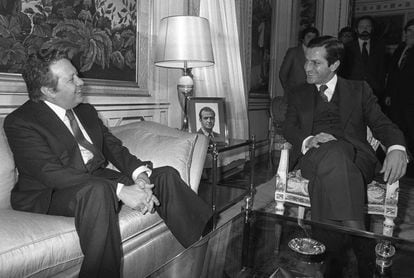Mário Soares photographed at a rally in the Portuguese town of Viana do Castelo.MIGUEL RIOPA (AFP)
The most poetic definition of Mário Soares (1924-2017) of all those that were heard at the Gulbenkian Foundation, in Lisbon, this Monday was made by his trusted man, José Manuel dos Santos: “His whole life was the constant writing of two words: democracy and freedom ”. Soares is, without any doubt, on the altars of Portugal after a political biography that he premiered as a young student protesting against the intellectual closure of the dictatorship and culminated in his recognition as one of the European statesmen of the 20th century. He was one of those politicians built on cultural armor that allowed him to see past the dim lights that often characterize political life. "My father was a politician who wanted to be a writer," evoked, among others, his daughter Isabel Barroso Soares, in the presentation of the first book of the
Works by Mário Soares
, which will be published in the coming years by the National Printing House-Casa de la Moneda. "For someone who had a literary vision of life, this is the most beautiful tribute," he added.
Soares was a prolific author, publishing more than 80 books that touched almost every genre, from poetry to essays to novels. His archive, however, is full of unpublished documents and writings of as yet unknown scope. "The Soares archive is for political history the equivalent of Fernando Pessoa's trunk for the history of literature," said José Manuel dos Santos, current cultural director of the EDP Foundation and Soares' right-hand man for 20 years. Dos Santos coordinates the team that is preparing the inventory of those three million documents that will nourish a collection, which could reach a score of volumes. On Monday Dos Santos made the public laugh, which filled the auditorium of the Gulbenkian Foundation with some anecdotes of the socialist politician:"He fantasized about writing a book about the five funniest funerals he had ever attended, like Brezhnev's."
President Adolfo Suárez with Portuguese Prime Minister Mario Soares, during his official visit to Spain in November 1977.
Regarding Soares, who preceded him in the Presidency of the Republic between 1986 and 1996, Marcelo Rebelo de Sousa said that he had had a “more than intense” life in his fight for democracy, in the Revolution and in the consolidation of freedoms and He defined it as "a colossus". "He had the wealth of having been a member of the Portuguese Communist Party and founded the Socialist Party, of having been a prominent protagonist of the Revolution, a deputy, prime minister and head of state," Rebelo said in a speech that he decided to improvise instead of reading it. that I had written. “Democracy requires a slightly longer memory and the effort of this collection is this: to extend the memory of the Portuguese so that they understand that it is possible that there is another politics beyond the politics that some do and another writing beyond what that some write ”,affirmed the President of the Republic, who today will present a book dedicated to Jorge Sampaio, another socialist head of state. One more example of the consideration and institutional respect that Portuguese politicians cultivate even if they do not share party militancy or ideological vision.
The Prime Minister, the socialist António Costa, stressed that in Soares' career, "the qualities that constitute a hero in our imagination are recognized: idealism, courage, audacity, tenacity and exemplaryity." Soares paid for his opposition to the dictatorship of Salazar and Marcelo Caetano with arrests and exiles. During his exile in the 1970s, he founded the Socialist Party in Berlin with other leaders and finally broke ties with communism. He was one of the main civil leaders of the revolutionary process that began in 1974 and defender of the call for elections. The first democratic scrutiny was carried out curiously at the same foundation where volume zero of the
Works of Mário Soares
was presented on Monday
, who became the prime minister of the young democracy between 1976 and 1978.
The opening title includes the reissue of the first book published by Mário Soares in 1950,
As Ideias Política e Sociais by Teófilo Braga
, on the thought of the republican leader.
During his reading at the Lisbon Faculty of Letters, Soares starred in an act of rebellion that cost him his thesis.
Faced with the comments of a member of the court, motivated by the political nature of the job, Soares tore the text from his hands and announced that he was leaving: "This is a shame, I have no regard for you."
Follow all the international information on
and
, or in
our weekly newsletter
.


/cloudfront-eu-central-1.images.arcpublishing.com/prisa/75Z2EBZT7SHOQ5OETHNJVFN22A.jpg)

/cloudfront-eu-central-1.images.arcpublishing.com/prisa/3FI7KHR4GI7ABUOQDZ3ENWASZQ.jpg)





/cloudfront-eu-central-1.images.arcpublishing.com/prisa/KMEYMJKESBAZBE4MRBAM4TGHIQ.jpg)


